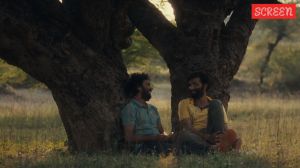The burden of hope
If the Hurriyat Conference had a shop to sell dreams to Kashmiris, the Muftis have opened a department store. They have been talking of peac...

If the Hurriyat Conference had a shop to sell dreams to Kashmiris, the Muftis have opened a department store. They have been talking of peace with dignity and honour. They have sought a dialogue with the militants to resolve the Kashmir dispute.
They acknowledge Pakistan’s role and the necessity of its involvement in the dialogue process. They promise to make Kashmir a bridge between the people of India and Pakistan. They have vowed to put an end to the security forces’ ‘reign of terror’ by repealing draconian laws like POTA, the Disturbed Areas Act and the Armed Forces Special (Powers) Act.
They have pledged a balm for Kashmir’s wounds by rehabilitating the families of slain militants, investigating cases of men missing in custody and setting up commissions to probe allegations of custodial killings and other rights abuses. They have promised a government job to every family. They speak of ‘ehtisaab’ — an inquiry into corruption and nepotism in the Farooq Abdullah government — and promise a clean and responsive administration.
It is the first time since Sheikh Mohammad Abdullah that Kashmiris have heard a mainstream political party talk this way. Mufti and his party, in fact, have achieved the threshold between mainstream politics and political separatism.
If Mufti fails, it is unlikely any mainstream leadership can ever take a similar route to inspire hope in Kashmir. Why did the Mufti duo adopt such a platform and invite Kashmiris to dream? Perhaps the People’s Democratic Party itself never dreamt that it would be able to rout the National Conference so completely. For an Opposition party, their manifesto was workable. But now that they are in power, their task becomes difficult.
Critics expected a sudden lowering of the pitch after the poll results. But, so far, power has not brought any drastic change in their rhetoric or programme, even as the party has hammered out a coalition with the Congress, which has a completely different approach to Kashmir.
In fact, after their victory, the Muftis reassured supporters at a rally in Anantnag that they will stand by their promises. Mehbooba Mufti went a step further, saying that though development issues like roads, water, electricity and jobs are important, the party’s priority will remain an honourable resolution of the Kashmir dispute through a dialogue.
The success of Mufti’s government has become not only a matter of survival for his party as a political force in Kashmir, it is also the last chance for a peace initiative through mainstream politics in Kashmir. If Mufti fails, Kashmiris will never trust the democratic process within the ambit of mainstream politics and nothing will draw them to the polling booth again. In fact, Kashmir might find itself reliving 1990 all over again.
Mufti’s plan for good governance is feasible; the mere change of guard has led to positive changes. Almost overnight, the police have become people-friendly. Bureaucrats are cautious while dealing with the common man. The arrogance of the official machinery has lessened. But as soon as Mufti touches the sensitive areas of his political and financial agenda, the sincerity of his desire for change will be tested.
What do the people expect from Mufti? First, immediate relief from the daily trauma of life in Kashmir and an end to the violence. He has begun by reining in the discredited Special Operations Group, thus sending a message to the officers of security agencies that an unlawful act is not acceptable even if it is committed in the ‘national interest’.
The people also want healing, which can begin when he starts fulfilling his promise of investigating the cases of more than three thousand young men who are missing in police and security force custody. After years, smiles have returned to the faces of Kashmir’s half widows, women whose husbands were picked up by the security agencies and never seen again. They expect an unambiguous answer from Mufti’s government to end their lingering uncertainty. Hundreds of young Kashmiris have been killed in custody, and the people want justice.
The Centre might allow Mufti’s government to move ahead, even though many of its policies will be seen as punishment to those who risked their lives to fight militancy. They will also demoralise the security agencies, and there is every likelihood that militant violence will intensify. But if there is a sincere effort to initiate an unconditional dialogue with the separatists accompanied by a ceasefire, things can move forward. Pakistan must also be involved. Will the Centre agree to such a proposal, especially as the NDA’s arch rival is part of Mufti’s government? If the Centre disagrees, which is likely, will Mufti sacrifice his chair and take the issue back to the people? Will
he take on the Centre on an issue that has international ramifications, even as his party remains in the mainstream?
The other pivotal area where Mufti’s dream project needs the Centre’s help is his rehabilitation programme. He has come up with a massive plan to reach out to the families of slain militants, to give every such family a government job and an ex gratia relief payment. He has also announced the enhancement of the state’s ex gratia relief to the relatives of the victims of violence to Rs 2 lakh. This requires thousands of crores. How will he convince the Centre to open its coffers for a scheme many in the NDA alliance look down upon as a mere separatist appeasement programme?
Mufti says this rehabilitation plan is in the nation’s interest. But the BJP must face the Congress in Gujarat next month, and noises about Mufti’s credentials are already being heard in its camp. Would the BJP be so generous as to support Mufti’s daring programme in J&K, when they could just as easily make it a poll issue against the Congress across the country?
The tragedy is that Mufti doesn’t have much time. He cannot keep public trust intact by cosmetic changes like reshuffling bureaucrats, or by symbolic measures like assimilating the SOG into the police force. If he fails to begin converting these dreams into reality in the next six months, there will be no buyers left in Kashmir.
Photos


- 01
- 02
- 03
- 04
- 05





























